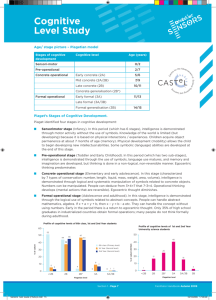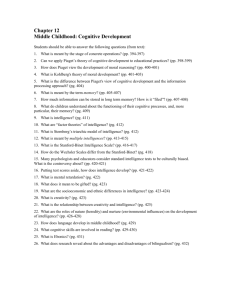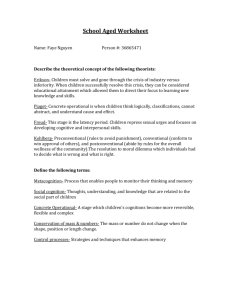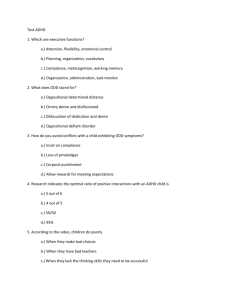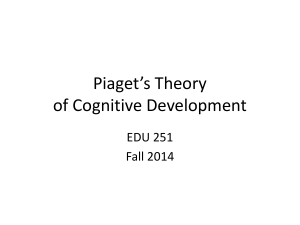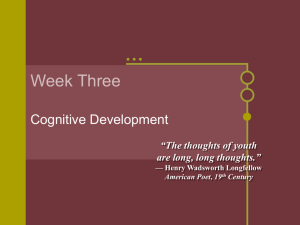COGNITIVE DEVELOPMENT IN MIDDLE CHILDHOOD
advertisement
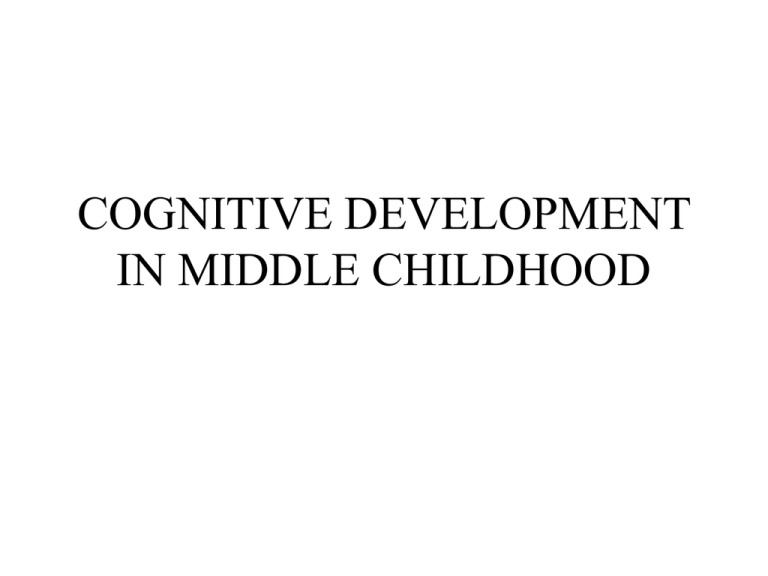
COGNITIVE DEVELOPMENT IN MIDDLE CHILDHOOD PIAGET’S CONCRETE OPERATIONAL STAGE • During this stage thought is logical, flexible, and organized in it’s application of concrete information. • The capacity for abstract thinking is not yet present. • The ability to execute conservation tasks is a clear indicator of this stage: Decentration and Reversibility. – Decentration-The ability to focus on several aspects of a problem at once and relate them – Reversibility-The ability to mentally go through a series of steps in a problem and then reverse the direction, returning to the starting point. CHARACTERISTICS OF THE CONCRETE OPERATIONAL STAGE • Seriation—the ability to order items along a quantitative dimension, such as length or width. • Transitive Inference—the ability to seriate or order items along a quantitative dimension— mentally. • Spatial Reasoning—By age 8 to 10, children can give well organized directions to important places. Horizontal Decalage • Piaget’s attempt at explaining the variations at which the concrete operations occur during Middle Childhood. INFORMATION PROCESSING THEORY • Alternative view of cognitive theory • Proposes that practice creates well organized cognitive schemes. Consequently, they demand less attention, become more automatic, and working memory is freed up (Berk, 1999; Case, 1998). • This theory focuses on the dimensions of memory, attention, and thinking INFORMATION PROCESSING THEORY DIVIDES THE MIND INTO: • Sensory Register: The area of the mental system in which sights and sounds are held briefly before they decay or are transformed into working or short-term memory. • Short-Term Memory: The conscious part of a mental system where we active work on a limited amount of information to ensure it is retained. • Long-Term Memory: The part that contains our permanent knowledge base. Knowledge base is limitless. Mental Strategies • In information processing, procedures that operate on and transform information, thereby increasing the efficiency and flexibility of thinking and the chances that information will be retained – Organization. Memory strategy of grouping together related items. Taking notes – Elaboration. Mental strategy of creating a relation between two or more items that are not members of the same category – Rehearsal. Memory strategy for repeating information Mental Strategies Cont. • By continuing these mental strategies, you develop greater organization of information and significantly increase knowledge retention. • Failure to apply appropriate mental strategies reduces the amount of knowledge retained Middle Childhood and Information Processing • An increase in information-processing capacity. Most likely due to synaptic pruning and mylenization. • Gains in inhibition. Due in part to brain maturation, middle schoolers develop increased ability to control external influences that may inhibit concentration. • Attention improves sharply between ages 6 and 9. ADHD • 5% of school age children are diagnosed with ADHD. • Boys tend to be diagnosed with ADHD than girls. • Children who are ADHD tend to be cognitively delayed on measures. Their ease of distractibility results in – Forgetfulness – Poor Planning, reasoning, and problem-solving – Poor impulse control Cognitive Self-Regulation • The process of continuously monitoring progress toward a goal, checking outcomes, and redirecting unsuccessful efforts. • Metacognition Intelligence • Nature or Nurture? – In the past, general assumptions were in support of genetic predisposition and stability over time. – Today, there is increasing evidence to suggest that intelligence is equally impacted by genetics and the environment. • Stability of Intelligence? – In general, studies of DQs in infants do not correlate to later expectations of IQ. However, there is some evidence of predictability from age 4 throughout adolescence. – Other studies purport extreme fluctuations by as much as 20 pts. Multidimensional Views of Intelligence • Sternberg’s Triarchic Theory of Intelligence – Componential: Highly intelligent individuals apply appropriate strategy application, knowledge acquisition, metacognition, and self-regulation. – Experiential: Highly intelligent individuals process information more skillfully in novel situations. – Contextual: Highly intelligent people skillfully adapt their information-processing skills to fit to a situation, they try to shape, or change it to meet their needs Gardner’s Multiple Intelligences • Linguistic. Sensitivity to the sounds, rhythms, and meanings of words and the different functions of language. (Poet, journalist). • Logico-mathematical. Sensitivity to and capacity to detect logical or numerical patterns; ability to handle long chains of logical reasoning. (Mathematician) • Musicial. Ability to produce and appreciate pitch, rhythm (or melody), and aesthetic sounding tones; understanding of the forms of musical expressiveness. (Violinist, composer). • Spatial. Ability to perceive the visualspatial world accurately, to perform transformations on those perceptions, and to re-create aspects of visual experience in the absence of relevant stimuli. • Bodily-kinesthetic. Ability to use the body skillfull for expressive as well as goal-directed purposes; ability to handle objects skillfully. (Dancer, athlete) • Naturalist. Ability to recognize and classify all varieties of animals, minerals, and plants. (Biologist). • Interpersonal. Ability to detect and respond appropriately to the moods, temperaments, motivations, and intentions of others. (Therapist, salesperson). • Intrapersonal. Ability to discriminate complex inner feelings and to use them to guide one’s own behavior; knowledge of one’s own strenghts, weaknesses, desires, and intellingence.
